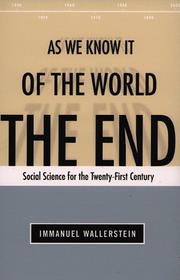| Listing 1 - 10 of 94 | << page >> |
Sort by
|

ISBN: 0816633975 Year: 1999 Publisher: Minneapolis (Minn.) : University of Minnesota press,
Abstract | Keywords | Export | Availability | Bookmark
 Loading...
Loading...Choose an application
- Reference Manager
- EndNote
- RefWorks (Direct export to RefWorks)
Social sciences --- Sociology --- Philosophy. --- Philosophy

ISBN: 1594510679 9781594510670 1594510660 9781594510663 Year: 2004 Volume: *1 Publisher: Boulder ; London Paradigm
Abstract | Keywords | Export | Availability | Bookmark
 Loading...
Loading...Choose an application
- Reference Manager
- EndNote
- RefWorks (Direct export to RefWorks)
Shows how the U.S. has been in decline since the 1970s and how these longer trends dovetail with current Bush administration policies, which Wallerstein describes as an attempt to reverse the decline in ways that are disastrous to the future of the country and the world. The book's middle section is a log of commentaries written between 2001 and 2004 detailing how the Bush administration has broken the pattern of foreign policies set by six presidents, from Richard Nixon to Bill Clinton. Wallerstein suggests that a threshold has been crossed that will make it difficult for future presidents to practice the kind of "soft" multilateralism in foreign policy American presidents have used in the past.
Geografie --- Sociale geografie --- Politieke Geografie. --- World politics --- 21st century --- Forecasting --- United States --- Foreign relations --- 1989 --- -United States --- Politics and government --- -World politics --- -Geografie --- 89.90 foreign policy. --- Diplomatic relations. --- Politics and government. --- Forecasting. --- United States. --- -89.90 foreign policy.
Book
ISBN: 9780520267572 0520267575 9786613277718 1283277719 0520948572 9780520948570 Year: 2011 Volume: I Publisher: Berkeley University of California press
Abstract | Keywords | Export | Availability | Bookmark
 Loading...
Loading...Choose an application
- Reference Manager
- EndNote
- RefWorks (Direct export to RefWorks)
Immanuel Wallerstein's highly influential, multi-volume opus, The Modern World-System, is one of this century's greatest works of social science. An innovative, panoramic reinterpretation of global history, it traces the emergence and development of the modern world from the sixteenth to the twentieth century.
940 --- Geschiedenis van Europa, van het Westen, van het Avondland --- Economic history --- Capitalism. --- Agriculture --- Economic aspects --- History --- Europe --- Economic conditions --- Economic history -- 16th century. --- Europe -- Economic conditions. --- Business & Economics --- Economic History --- Economic Theory --- 940 Geschiedenis van Europa, van het Westen, van het Avondland --- Capitalism --- History. --- Economic conditions. --- Market economy --- Economics --- Profit --- Capital --- E-books --- 940 History of Europe. History of the West --- History of Europe. History of the West --- absolute monarchy. --- agriculture. --- capitalism. --- class formation. --- colonialism. --- commerce. --- crusades. --- divine right of kings. --- division of labor. --- economic history. --- economics. --- empire. --- fall of rome. --- feudalism. --- global economy. --- global history. --- imperialism. --- indigenous peoples. --- international commerce. --- international trade. --- marxism. --- modern world. --- navy. --- nonfiction. --- religion. --- religious war. --- roman empire. --- serfs. --- silk road. --- slavery. --- social science. --- spice routes. --- statism. --- trade. --- war. --- western civilizations. --- world economy.
Book
ISBN: 2876788985 9782876788985 Year: 2003 Publisher: France : Éditions de l'aube,
Abstract | Keywords | Export | Availability | Bookmark
 Loading...
Loading...Choose an application
- Reference Manager
- EndNote
- RefWorks (Direct export to RefWorks)
Pour l'auteur, historien et politologue, la chute du mur de Berlin et le démembrement de l'URSS montrent l'échec du libéralisme et non le contraire. Plus encore que la simple chute du communisme, il s'agit d'un effondrement de la "géoculture du système monde moderne", celle dont le coeur était un Etat libéral-réformiste plus ou moins autoritaire. Il reste à inventer l'avenir.
Libéralisme --- Postcommunisme --- Développement économique --- Droits de l'homme (Droit international) --- Post-communism --- Liberalism --- Economic development --- Human Rights --- Libéralisme --- Développement économique --- Liberalism. --- Post-communism. --- Economic development. --- Human rights. --- Economic theory --- History
Book
ISBN: 9782707157454 2707157457 Year: 2009 Volume: 301 Publisher: Paris : La Découverte,
Abstract | Keywords | Export | Availability | Bookmark
 Loading...
Loading...Choose an application
- Reference Manager
- EndNote
- RefWorks (Direct export to RefWorks)
Social history --- Social change --- Social systems --- Globalization --- Histoire sociale --- Changement social --- Systèmes sociaux --- Mondialisation --- Social aspects --- Aspect social --- Systèmes sociaux --- Globalization - Social aspects
Book
ISBN: 0745608760 0745609112 9780745608761 9780745609119 Year: 1991 Publisher: Oxford : Polity Press,
Abstract | Keywords | Export | Availability | Bookmark
 Loading...
Loading...Choose an application
- Reference Manager
- EndNote
- RefWorks (Direct export to RefWorks)
Economic development --- Capitalism --- Economic History. --- Economics --- Social sciences --- History. --- 316.2 --- -Economic development --- -Economics --- -Social sciences --- -#SBIB:316.20H10 --- 316 <09> --- Behavioral sciences --- Human sciences --- Sciences, Social --- Social science --- Social studies --- Civilization --- Economic theory --- Political economy --- Economic man --- Development, Economic --- Economic growth --- Growth, Economic --- Economic policy --- Statics and dynamics (Social sciences) --- Development economics --- Resource curse --- Market economy --- Profit --- Capital --- Sociologische richtingen. Sociologische scholen. Sociologen --- History --- Grondleggers van de sociologie: algemeen --- Sociologie --(algemeen)--Geschiedenis van ... --- Economic History --- Economic history. --- 316 <09> Sociologie --(algemeen)--Geschiedenis van ... --- 316.2 Sociologische richtingen. Sociologische scholen. Sociologen --- Economic history --- #SBIB:316.20H10 --- Economic conditions --- History, Economic --- Sociologie --(algemeen)--Geschiedenis van .. --- Sociologie --(algemeen)--Geschiedenis van . --- Sociologie --(algemeen)--Geschiedenis van --- Economic development - History --- Capitalism - History --- Economics - History --- Social sciences - History --- FRANCE --- HISTORIOGRAPHIE

ISBN: 9781595580610 1595580611 Year: 2006 Publisher: New York (N.Y.) New Press
Abstract | Keywords | Export | Availability | Bookmark
 Loading...
Loading...Choose an application
- Reference Manager
- EndNote
- RefWorks (Direct export to RefWorks)
Civilization, Western. --- Eurocentrism. --- Social values --- Universalism. --- Geografie --- Political aspects. --- Sociale en economische geografie --- Algemeen.
Book
ISBN: 0520267605 9786613277749 0520948602 1283277743 9780520948600 6613277746 9780520267602 9780520267619 0520267613 Year: 2011 Publisher: Berkeley University of California Press
Abstract | Keywords | Export | Availability | Bookmark
 Loading...
Loading...Choose an application
- Reference Manager
- EndNote
- RefWorks (Direct export to RefWorks)
Immanuel Wallerstein's highly influential, multi-volume opus, The Modern World-System, is one of this century's greatest works of social science. An innovative, panoramic reinterpretation of global history, it traces the emergence and development of the modern world from the sixteenth to the twentieth century. This new volume encompasses the nineteenth century from the revolutionary era of 1789 to the First World War. In this crucial period, three great ideologies-conservatism, liberalism, and radicalism-emerged in response to the worldwide cultural transformation that came about when the French Revolution legitimized the sovereignty of the people. Wallerstein tells how capitalists, and Great Britain, brought relative order to the world and how liberalism triumphed as the dominant ideology.
Capitalism. --- Ideology. --- Liberalism. --- Liberalism --- Capitalism --- Ideology --- Law, Politics & Government --- Business & Economics --- Economic History --- Human Rights --- Market economy --- Liberal egalitarianism --- Knowledge, Theory of --- Philosophy --- Political science --- Psychology --- Thought and thinking --- Economics --- Profit --- Capital --- Liberty --- Social sciences
Book
ISBN: 1412360293 Year: 2007 Publisher: Chicoutimi : J.-M. Tremblay,
Abstract | Keywords | Export | Availability | Bookmark
 Loading...
Loading...Choose an application
- Reference Manager
- EndNote
- RefWorks (Direct export to RefWorks)
Book
ISBN: 1412360307 Year: 2007 Publisher: Chicoutimi : J.-M. Tremblay,
Abstract | Keywords | Export | Availability | Bookmark
 Loading...
Loading...Choose an application
- Reference Manager
- EndNote
- RefWorks (Direct export to RefWorks)
| Listing 1 - 10 of 94 | << page >> |
Sort by
|

 Search
Search Feedback
Feedback About UniCat
About UniCat  Help
Help News
News